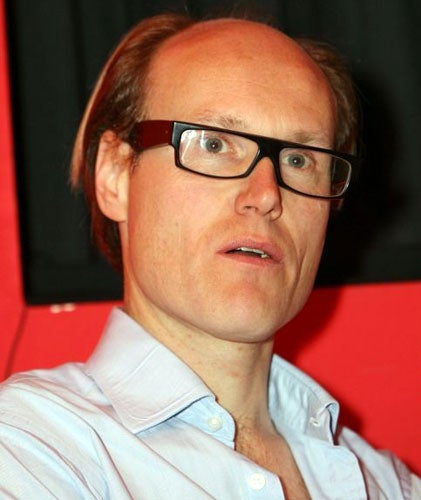BBC poised to turn its new arts editor into next 'star presenter'
Director of Tate Media is the latest journalist to be poached by the corporation

Your support helps us to tell the story
From reproductive rights to climate change to Big Tech, The Independent is on the ground when the story is developing. Whether it's investigating the financials of Elon Musk's pro-Trump PAC or producing our latest documentary, 'The A Word', which shines a light on the American women fighting for reproductive rights, we know how important it is to parse out the facts from the messaging.
At such a critical moment in US history, we need reporters on the ground. Your donation allows us to keep sending journalists to speak to both sides of the story.
The Independent is trusted by Americans across the entire political spectrum. And unlike many other quality news outlets, we choose not to lock Americans out of our reporting and analysis with paywalls. We believe quality journalism should be available to everyone, paid for by those who can afford it.
Your support makes all the difference.When the BBC lured Jeff Randall away from his job in print journalism to fill the illustrious role of business editor, his Essex charm and City expertise instantly transformed him into a "big-name presenter".
His success set off something of a trend for high-profile appointments made from outside the world of broadcasting. The likes of the current business editor, Robert Peston, poached from The Sunday Telegraph, and the former sports editor Mihir Bose, from The Daily Telegraph, followed.
Now Will Gompertz, 44, the director of Tate Media, is predicted to follow the upward trajectory to become the next "star presenter" after being appointed the BBC's first arts editor. Few in the art world would doubt that Gompertz is one of Tate's most media friendly directors who is fully plugged into the arts scene.
Since 2006, he has overseen the Tate's digital division and Tate Etc, an in-house magazine. He runs public events including the UBS Long Weekend Festival at Tate Modern, in which the public is invited to join in with an art project over a weekend.
He is a board member of the campaign group National Campaign for the Arts and has written about the arts for more than 15 years. He founded Shots magazine in 1990 and has produced several programmes about the arts, the most recent being Taken For A Ride, a documentary for Channel 4.
His profile was further raised when he was voted one of the world's top 50 creative thinkers by the New York-based Creativity Magazine and by his appearance at the Edinburgh Fringe Festival in his one-man show, Double Art History.
He will take up his role at the BBC in the next few months. The post is seen as being on a par with Peston's business editor role and with Nick Robinson's role as politics editor.
Dominic Ponsford, the editor of Press Gazette, said these former appointments were proof that bringing in fresh blood to broadcasting and luring specialists from outside the BBC instead of making internal appointments, was a successful formula.
"If you take Robert Peston as an example, he's proof that recruiting high-profile people from outside broadcasting and the BBC really works. Peston has become a huge star and really made the credit crunch his own. There is a bit more of a move now in journalism for individuals to become brands in their own rights."
The BBC will no doubt expect big things of Gompertz by the BBC. In a statement, Helen Boaden, the BBC's director of news, called it "an exciting appointment".
"He will make an important contribution to our arts coverage in News and across the BBC," she said.
"The creation of a new arts editor role for BBC News is part of the BBC's deeper commitment to arts and music throughout 2010 with a wide range of initiatives aimed at supporting cultural Britain and better serving the public."
Gompertz said: "It's a great opportunity to be able to engage with a wide audience. It's always useful for organisations to have multiple voices and view points within them so I hope I can offer that slightly different viewpoint."
News idols: The BBC's high-profile signings
Robert Peston, 49
A former banking editor of the Financial Times, he joined the BBC from the Sunday Telegraph in 2006 as business editor. Last year he broke stories such as the collapse of Northern Rock and Lloyd's TSB's takeover of HBOS, which led to him being dubbed "the face of the credit crunch". His golden contacts book and respected blog more than compensate for his quirky delivery style.
Mihir Bose, 62
Formerly a journalist with The Daily Telegraph, Bose became the first sports editor for BBC News in 2006, pushing sport up the news agenda. Born in India, he moved to the UK for university and began his career as a freelance cricket reporter for the London radio station LBC in the 1970s, before turning to print journalism.Last month, Bose resigned from the BBC, citing personal reasons.
Jeff Randall, 54
Formerly a Sunday Times journalist, he was made the BBC's first business editor at the behest of Greg Dyke, and promptly revolutionised the corporation's business coverage. He later moved to Sky where he was given his own business programme on Sky News, Jeff Randall Live. He is now royalty at the Telegraph, for which he still writes regularly and enjoys the title of editor-at-large.
Nick Robinson, 45
Robinson joined the BBC as a graduate trainee in 1986, working on Newsround and Crimewatch before becoming chief political correspondent of BBC News 24. He left in 2002 to go to ITV News, but returned in 2005. He is often voted Britain's best political journalist. An intelligence briefing for Barack Obama stated that he had "carved out a niche as a persistent irritant to world leaders".
Join our commenting forum
Join thought-provoking conversations, follow other Independent readers and see their replies
Comments